PHOENIX — This isn’t the first time Hollywood has been scrutinized for its lack of diversity and inclusiveness on screen. A recent study shows nearly all fictional characters with disabilities are portrayed by able-bodied actors. Movies like “Wonderstruck,” where hearing actress Julianne Moore plays a deaf character, show how the deaf community is underrepresented in mainstream media. However, it is not due to a lack of available deaf actors.
At St. Stephen’s Episcopal Church in Phoenix, the Detour Company Theatre is dedicated to making the arts accessible for people with disabilities. It produces up to three major Broadway productions a year, has 46 actors and an audience of 300 to 400 people per show. Detour has been recognized as a theater company that celebrates actors with disabilities.
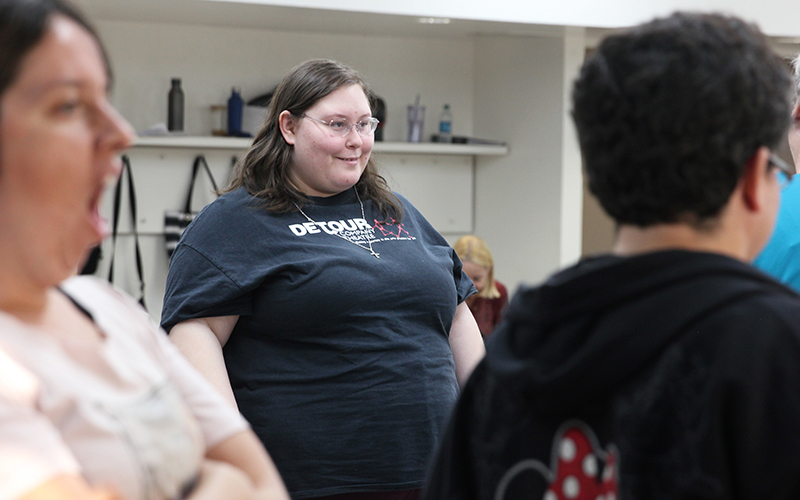
Hailey Simon at rehearsals at Detour Company Theatre. (Photo by Allison Bailey/Cronkite News)
Hailey Simon, a 21-year-old deaf actress, has been a part of the theater company for two years. She was unsure about her future in acting until she started working with Detour.
Editor’s note:
A previous version of this story incorrectly spelled the name of the Detour Company Theatre and gave an incorrect city for St. Stephen’s Episcopal Church, which is in Phoenix. The story here has been corrected, but clients who used earlier versions are asked to run the correction that can be found here.
“Yes, I really like it because before, I was in the audience, it was great, but now to be up on the stage I can feel from their expressions and things like that. I can feel that they are really connected to me,” Simon said through an interpreter.
Simon understands why some deaf actors are hesitant about getting into acting, but she believes Hollywood needs better representation.
“Maybe deaf actors don’t want to do a lot because there is also the added expense for paying for an interpreter for whatever they’re doing as well. They really need to get a deaf individual no matter what. It should be a deaf individual,” Simon said of casting decisions.
Detour Company Theatre annually performs plays that are interactive for both the actors and the audience.
“We turn off the lights so everyone is singing in the dark to feel what it’s like to be blind, and we stop the piano and sign-language the music to know what it’s like to be deaf,” said Sam, the artistic director at Detour Company Theatre.
The company is preparing for “Joseph and the Amazing Technicolor Dreamcoat” in January, when Simon will act, sing and be a narrator. At practices, Simon has a sign language interpreter to help her with her lines.
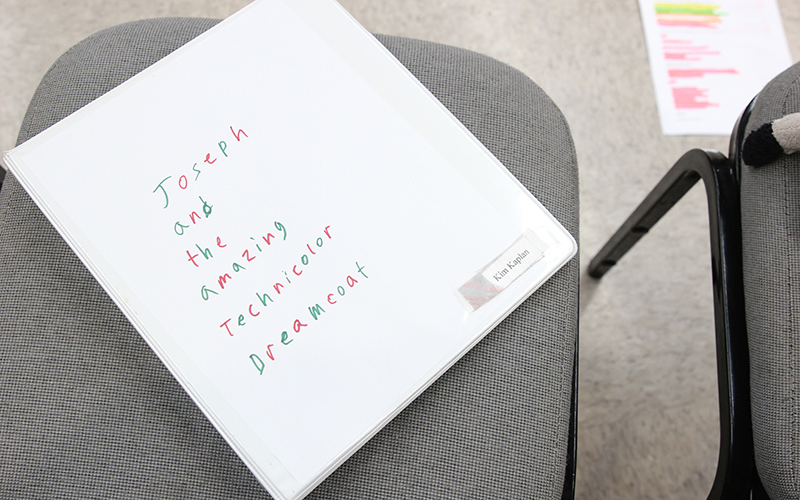
The script for the play “Joseph and the Amazing Technicolor Dreamcoat.” (Photo by Allison Bailey/Cronkite News)
Sam, who goes only by her first name, founded the Detour Company Theatre. She started it with friends when her son wanted to get into acting, but she could not find an arts program that had a theater production for people with disabilities.
“We don’t make it about the disability. We find ways to make the story. Maybe that’s what we need to do in life for one another. Instead of focusing on why it’s not working, find a way to make it work. How do we make it fun, successful and real?” Sam asked. “Detour takes no government help or money. It’s a theater company first, not a social service.”
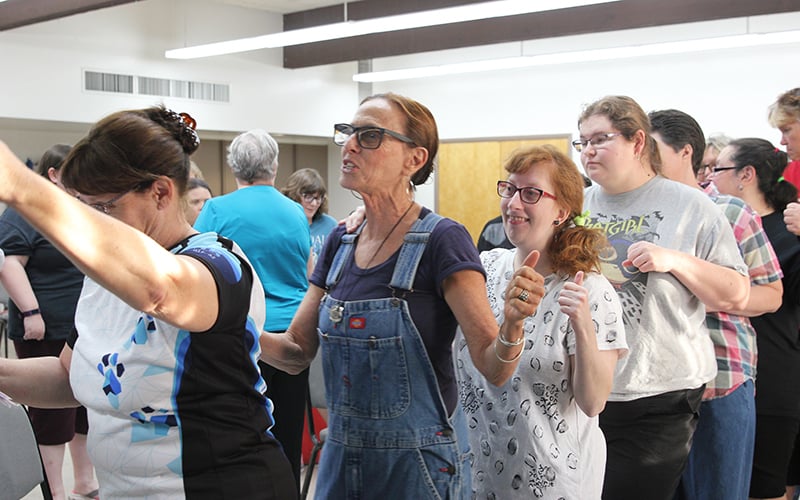
Sam and actors practice at Detour Company Theatre. (Photo by Allison Bailey/Cronkite News)
Simon hopes to one day work as an actress in Arizona. For now, Detour is a place where she can live out her dream of theater and connect with people through her work.
“They make me feel like family, I just love it. Just feels like a family. They’re open to sign language and learning sign language and they just accept me as I am,” Simon said.
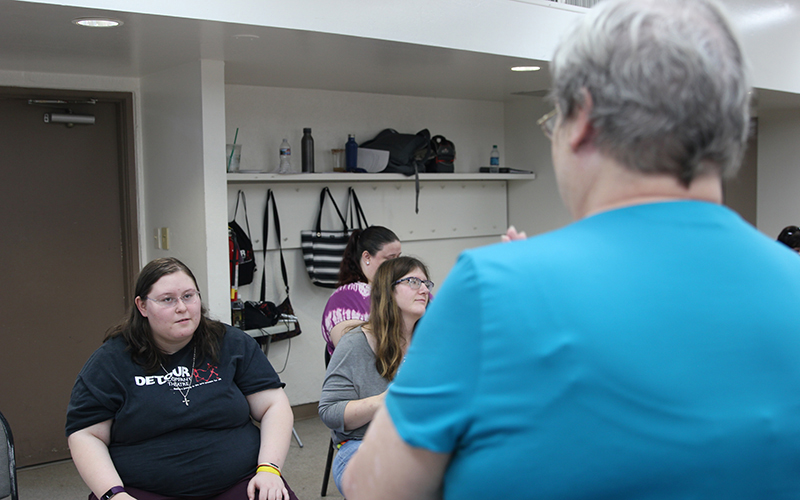
Hailey Simon and her interpreter communicate using sign language. (Photo by Allison Bailey/Cronkite News)
Successful deaf film companies like Hollywood-based ASL Films and award-winning television shows like ABC Family’s “Switched at Birth” are examples of more authentic deaf narratives.
According to a study on employment of actors with disabilities by The Ruderman Family Foundation, 95 percent of characters with disabilities are played by able-bodied actors. The foundation fights for the rights of people with disabilities and brings awareness to issues faced by people with disabilities.
“Although people with disabilities make up nearly 20 percent of our population, they are still significantly under-represented on television,” the study said.
At the Detour Company Theatre, Sam said filmmakers need to be more resourceful and seek the right representation of deaf characters. This could help the hearing mainstream to better understand deaf culture.
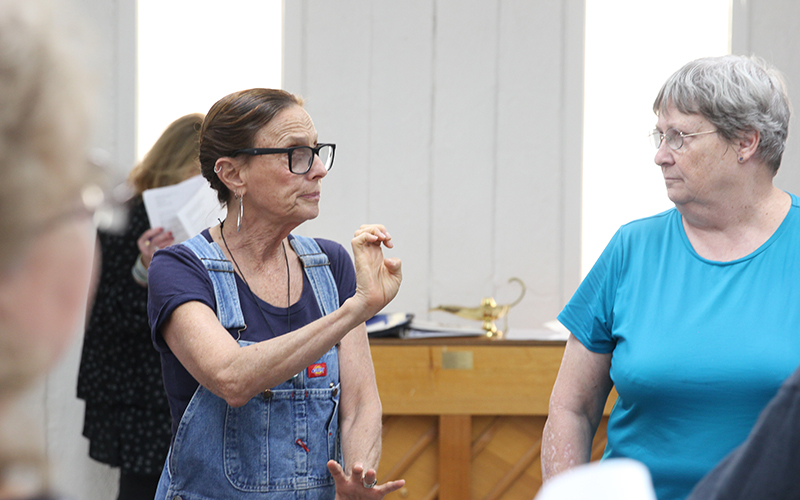
Sam giving directions to an actor in sign language. (Photo by Allison Bailey/Cronkite News)
“They are talented. They know their art better than any person who can pretend to be them. It is insulting and degrading in this society to not honor the artistic talent and contribution of any group,” Sam said.
“We’re people who are full of talent and dreams and hope and we don’t need someone to usurp that. We don’t have deaf people asking to portray hearing actors. We have deaf people asking if they can portray themselves.”
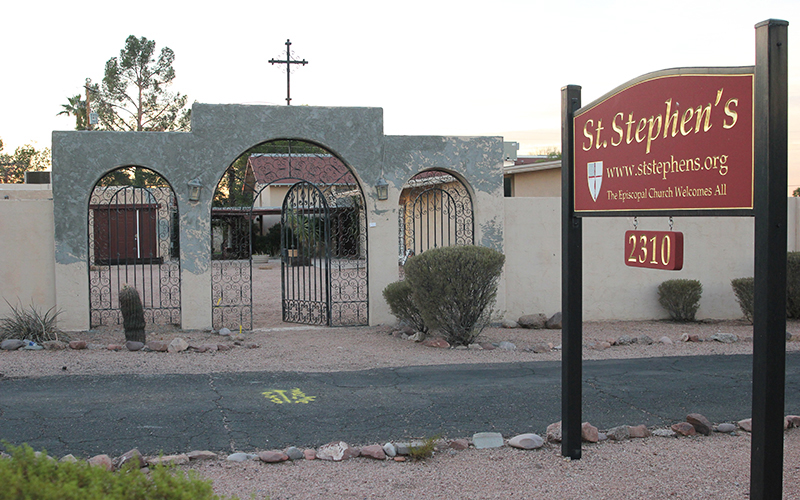
St. Stephen’s Episcopal Church in Phoenix is where the Detour Company Theatre rehearses. (Photo by Allison Bailey/Cronkite News)